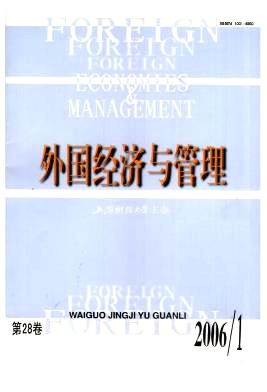论消费者行为研究范式的转向
外国经济与管理 2006 年 第 28 卷第 01 期, 页码:54 - 59
摘要
参考文献
摘要
在一百多年的发展历史中,消费者行为研究经历了由实证主义向非实证主义范式的转向。我们认为,消费者理性假设变更是推动转向的主要动因。消费者是被动、消极的研究对象还是具有主观能动性、追求消费体验的消费主体,这是两大范式根本分歧之所在。人类学中的民族志法是消费者行为研究的前沿方法。
[1]托马斯.库恩著;金吾伦译.科学革命的结构[M].北京:北京大学出版社,2003:10.
[2]Firat A F,Sherry J F Venkatesh.Marketing in a postmodern world[J].European Journal of Marketing,1995,29(1):45.
[3]Shaughnessy.A Return to reason in consumer behavior:a hermeneutical approach[J].Advances in Consumer Research,1985,12:308.
[4]Firat A F.Fragmentations in the postmodern[J].Advances in Consumer Research,1992,19:204-208.
[5]Elliott Richard.Symbolic meaning and postmodern consumer culture in rethinking marketing[J].Marketing Account-ings,1998,l3(2):234-245.
[6]Thompson Craig J.Maura Troester.Consumer value systems in the age of postmodern fragmentation:the case of thenatural microculture[J].Journal of Consumer Research,2002,28(3):1228-1229.
[7]Foxall G R.Science and interpretation in consumer research:a radical behaviorist perspective[J].European Journal ofMarketing,1995,29(3):34-37.
[8]Firat A F,Sherry J F.Venkatesh.Marketing in a postmodern world[J].European Journal of Marketing,1995,29(2):45.
[9]West H J,A I Baum G.Modern marketing thought(3rdEd)[M].London:Collier Macrmillan Publishers,1974:212-234.
[10]Barry T E,Howard D.A review and critique of the hierarchy of effects in advertising[J].International Journal of Ad-vertising,1990,l9(4):124-167.
[11]Howard J A,Sheth J N.The theory of buyer behavior[M].New York:Wiley,1969:12-78.
[12]Festinger L A.Theory of cognitive dissonance[M].New York:Harper and Row,1969:12-36.
[13]Goffman E.The presentation of self in every-day life[M].Douleday:Anchlor Books,2001:362-378.
[14]Holbrook M B,Hirschman E.The experimental aspects of consumption:consumer fantasies,feelings,and fun[J].Journal of Consumer Research,1982,l9(2):135-138.
[15]Karin M Ekstom.Revisiting the family tree:historical and future consumer behavior research[J].Academy of Market-ing Science Review,2003,2:456-467.
[2]Firat A F,Sherry J F Venkatesh.Marketing in a postmodern world[J].European Journal of Marketing,1995,29(1):45.
[3]Shaughnessy.A Return to reason in consumer behavior:a hermeneutical approach[J].Advances in Consumer Research,1985,12:308.
[4]Firat A F.Fragmentations in the postmodern[J].Advances in Consumer Research,1992,19:204-208.
[5]Elliott Richard.Symbolic meaning and postmodern consumer culture in rethinking marketing[J].Marketing Account-ings,1998,l3(2):234-245.
[6]Thompson Craig J.Maura Troester.Consumer value systems in the age of postmodern fragmentation:the case of thenatural microculture[J].Journal of Consumer Research,2002,28(3):1228-1229.
[7]Foxall G R.Science and interpretation in consumer research:a radical behaviorist perspective[J].European Journal ofMarketing,1995,29(3):34-37.
[8]Firat A F,Sherry J F.Venkatesh.Marketing in a postmodern world[J].European Journal of Marketing,1995,29(2):45.
[9]West H J,A I Baum G.Modern marketing thought(3rdEd)[M].London:Collier Macrmillan Publishers,1974:212-234.
[10]Barry T E,Howard D.A review and critique of the hierarchy of effects in advertising[J].International Journal of Ad-vertising,1990,l9(4):124-167.
[11]Howard J A,Sheth J N.The theory of buyer behavior[M].New York:Wiley,1969:12-78.
[12]Festinger L A.Theory of cognitive dissonance[M].New York:Harper and Row,1969:12-36.
[13]Goffman E.The presentation of self in every-day life[M].Douleday:Anchlor Books,2001:362-378.
[14]Holbrook M B,Hirschman E.The experimental aspects of consumption:consumer fantasies,feelings,and fun[J].Journal of Consumer Research,1982,l9(2):135-138.
[15]Karin M Ekstom.Revisiting the family tree:historical and future consumer behavior research[J].Academy of Market-ing Science Review,2003,2:456-467.
引用本文
晏国祥, 方征. 论消费者行为研究范式的转向[J]. 外国经济与管理, 2006, 28(1): 54–59.
导出参考文献,格式为:





 7386
7386  0
0

